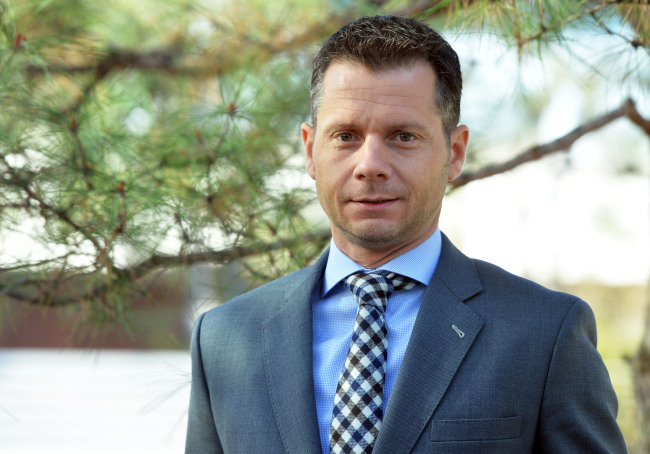Amid tightening energy efficiency regulations for buildings around the globe, it is essential for institutional investors to consider the level of sustainability of their real estate portfolios, said the Asia-Pacific head of a global real estate assessment agency.
“More and more countries are strengthening the sustainability rules for real estate. And it is impossible to ignore the sustainability aspect of the buildings when thinking of the future value of the buildings,” Ruben Langbroek, head of Asia-Pacific for Global Real Estate Sustainability Benchmark, said in an interview with The Korea Herald.
 |
Ruben Langbroek, head of Asia-Pacific for the Global Real Estate Sustainability Benchmark (Yoon Byung-chan/The Korea Herald) |
Founded in 2009, GRESB evaluates the environmental, social and governance performance of real assets around the world, including real estate portfolios and infrastructure assets, and provides real assets investors with information needed to monitor and manage the ESG performance of their investments.
The GRESB data is used by about 60 pension funds and their fiduciaries, jointly representing over $7.5 trillion in assets under management. It has covered over 1,000 listed property companies and private equity funds.
Langbroek stressed that evaluating the sustainability or the ESG performance of real estate when making an investment is part of “responsible investing.”
“Real estate has a crucial impact on the environment as 30 percent of the buildings in the world are accountable for the greenhouse gas emissions,” he said.
In the wake of the Paris climate change agreement made last year, more countries are gearing up to pose stricter sustainability rules on the real estate sector.
For example, the UK is preparing to limit the sales or rental of the buildings from 2018 if the energy performance rating of the buildings is under level E. In Australia, the government requires the disclosure of Building Energy Efficiency Certificates during the sale, lease or sublease of office space larger than 1,000 square meters.
The GRESB Asia-Pacific head, however, pointed out that awareness over the importance of evaluating ESG performance is low in Korea, despite a relevant provision in the National Pension Act.
“While I have spoken to many real estate managers here last year, I found that many were not aware of it while some knew about the EGS performance but were not interested. There seems to be no urgency,” Langbroek said.
“Although Korea does have a provision that states about the ESG factor, the language is weak,” he added.
The National Pension Act Article 102, for instance, stipulates that the welfare minister “may take into account environmental, social, and governance factors related to investment targets to achieve a long-term and stable revenue.”
“I think the rule should say ‘should’ as it is part of the fiduciary’s duties for the institution investors to act in the best interests of their clients, beneficiaries and society as a whole. It is important to realize that you have to take into account all of these in order to establish a long-term value creation and sustainable and stable financial system and economy.”
While it is important for the government to initiate a “stick and carrot approach” to change the market behavior to seek green buildings, it is also essential to break the public misconception that the green buildings are more expensive, he highlighted.
“There are many low-cost or no-cost strategies that will help you. Even with a slight initial investment, they help you recoup the investment much more quickly, and plus, you will see your returns more quickly. This includes a ‘passive design first’ strategy that utilizes the natural energy resources and maximizes the energy efficiency.”
But most importantly, investors, who are on the top of the investment chain, must be aware of their significant role in the real estate market.
“For institutional investors, it is no longer about creating the instant profit. It’s about long-term sustainable return. Investors are the key to driving changes.”
By Lee Hyun-jeong (
rene@heraldcorp.com)







![[Today’s K-pop] Blackpink’s Jennie, Lisa invited to Coachella as solo acts](http://res.heraldm.com/phpwas/restmb_idxmake.php?idx=644&simg=/content/image/2024/11/21/20241121050099_0.jpg)
